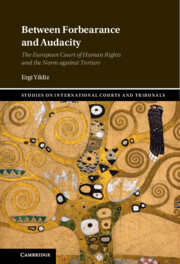‘Between Forbearance and Audacity meticulously explains how and why the European Court of Human Rights has expanded the prohibition on torture from a narrow negative interpretation that bans government agents from using torture during interrogations to a broader understanding that includes positive government obligations to prevent torture and protect victims in multiple contexts, such as domestic abuse and medical settings. However, the Court has not always followed an expansive approach. Using in depth interviews and a systematic content analysis, Yildiz demonstrates that pushback from Western European governments has at times curtailed the Court, such as on cases involving refugees. Deeply rooted in both law and political science, this is a masterful book that should be of interest to those interested in human rights, international courts, and the development of international legal norms.'
Erik Voeten - Peter F. Krogh Professor of Geopolitics and Justice in World Affairs, Edmund E. Walsh School of Foreign Service and Government Department, Georgetown University
‘Ezgi Yildiz's carefully researched book is the crucial text on changing norms of torture and inhumane and degrading treatment. But it also offers the most impressive evidence to date of how human rights can evolve through the audacious interpretations of a court.'
Kathryn Sikkink - Ryan Family Professor, Kennedy School of Government, Harvard University
‘Between Forbearance and Audacity tells the story of how the European Court of Human Rights has developed the norm against torture over the past five decades. It shows how courts are always situated in history and that the development of the law necessarily has to be tailored to the constraints that courts face at given moments of time. This is neither an optimistic nor pessimistic account of the European Court of Human Rights; it is realistic account that considers all the complexity of making torture illegal in Europe.'
Mikael Rask Madsen - Professor and Director of iCourts, Faculty of Law, University of Copenhagen
‘Between Forbearance and Audacity is an insightful and ambitious analysis of how the European Court of Human Rights has transformed the norm against torture and renegotiated its own position in the process. This book brings together rich empirical analyses and a novel conceptual framework to advance the current thinking about how human rights courts work and how they respond to pressure from member states and beyond. This is a must-read for anyone interested in understanding how international human rights courts shape, and are shaped by, evolving human rights norms.'
Courtney Hillebrecht - Professor of Political Science, University of Nebraska-Lincoln
‘In Between Forbearance and Audacity, Ezgi Yildiz chronicles and explains an international legal revolution, in which the European Court of Human Rights expanded the meaning of torture and the responsibility of states to prevent it. Drawing on a range of quantitative, qualitative, and interpretive methods, Yildiz provides the definitive account of the transformation of the anti-torture law in Europe. Essential reading for political scientists, lawyers, and anyone who wants to understand the conditions for the protection of human rights around the world.'
Mark Pollack - Professor of Political Science and Law, Temple University



